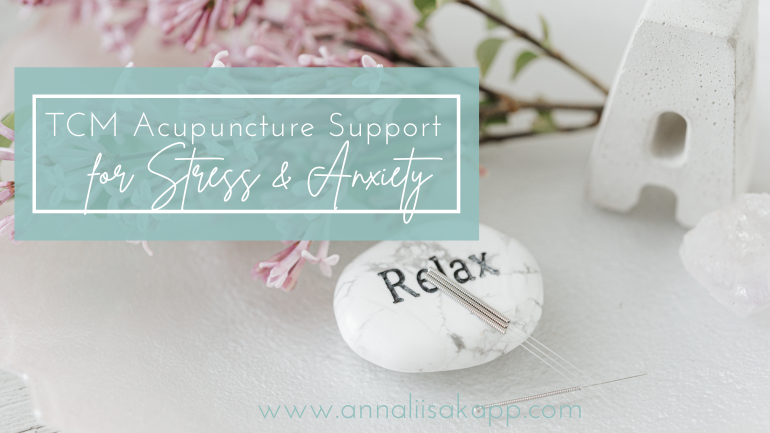
.
Women in their 30s to 50s are often in the thick of life’s busiest stages, balancing career, family, and social commitments. It’s no surprise that stress and anxiety are common challenges during this time. According to Statistics Canada, a study found that the proportion of Canadians aged 15 years and older with a generalized anxiety disorder doubled from 2012 to 2022 and approximately 1 in 10 Canadians suffers from generalized anxiety disorder. (source)
.
Each of us can have a different experience and severity of symptoms based on our health history, coping mechanisms, and current environment. Here are some common symptoms of anxiety:
- Constant worrying
- Restlessness
- Irritability
- Avoidance behavior and isolation
- Difficulty concentrating
- Fatigue
- Muscle tension
- Sleep disturbances
- Rapid heartbeat & sweating
- Digestive issues (constipation, loose bowels, bloating)
.
From a Traditional Chinese Medicine perspective, we can have certain patterns that leave us more susceptible to feeling nervousness or anxiety. These can include:
.
- Blood Deficiency: In TCM, blood deficiency is a common cause of anxiety, especially in women. Blood nourishes the heart and mind (Shen). When blood is deficient, it fails to adequately nourish the heart, leading to symptoms like anxiety, palpitations, and insomnia. Acupuncture treatments focus on boosting the body’s blood production and circulation, helping to calm the mind and reduce anxiety.
- Shen (Heart) Disturbance: The Shen is considered the spirit or mind in TCM, and it resides in the heart. When the heart is disturbed, either by emotions, poor sleep, or other factors, the Shen becomes unsettled, leading to anxiety and restlessness. Acupuncture points that calm the heart and settle the Shen can help restore peace and emotional balance.
- Spleen (SP) Deficiency: The Spleen plays a crucial role in digestion and the production of Qi (energy) and blood. When the Spleen is weak, it can lead to digestive issues and a lack of vital nutrients, which affects the mind. Symptoms include anxiety, worry, and fatigue. Acupuncture helps strengthen the Spleen, improving digestion and energy levels, which in turn helps alleviate anxiety.
- Liver Qi Stagnation: The Liver is responsible for the smooth flow of Qi and emotions in the body. When the Liver Qi is stagnant, it can cause stress, irritability, and anxiety. This stagnation can be due to emotional stress, poor diet, or lack of exercise. Acupuncture treatments aim to unblock and move the Liver Qi, promoting emotional well-being and reducing stress.
The Science Behind Acupuncture and Stress Reduction
Acupuncture, a key component of Traditional Chinese Medicine (TCM), has been used for centuries to promote relaxation and stress related symptoms such as anxiety. The treatment involves inserting very fine needles into specific points on the body, known as acupuncture points, to influence the flow of energy, or “Qi.”
.
Several scientific studies have shown that acupuncture can activate the body’s parasympathetic nervous system, responsible for the “rest, digest and heal” response. This helps to lower stress hormones like cortisol, promoting a sense of calm and relaxation. It can also increase the release of endorphins, serotonin, and dopamine, the body’s natural “feel-good” chemicals, which can reduce anxiety and elevate mood.
.
How Acupuncture Helps With Stress and Anxiety
Acupuncture can be particularly beneficial for women experiencing stress and anxiety for several reasons:
.
- Relaxation Response: The treatment stimulates points that activate the parasympathetic nervous system, reducing stress hormones, and promoting relaxation. This is an important first step to harmonize hormones and support cardiovascular health, like normalized blood pressure.
- Hormonal Balance: Acupuncture can help balance hormones like cortisol, insulin, and progesterone, which can contribute to stress and anxiety when disrupted.
- Reduced Muscle Tension: Stress often leads to muscle tension, headaches, and discomfort. Acupuncture can release this tension, providing relief.
- Improved Sleep: By calming the mind (Shen) and body, acupuncture can help improve sleep quality, which is often disrupted by stress and anxiety.
- Strengthened Digestion: By improving the Spleen (which is the organ system related to digestion), we can promote regular bowel movements, enhance mental and physical energy, improve your resilience to worry and stressful thoughts, and create a more calm focused mind.
.
Reclaiming Balance Through Acupuncture
If you find yourself overwhelmed by the demands of everyday life, acupuncture may be the solution you need to regain balance and calm, along with nutritional and lifestyle support. Whether you’re experiencing heightened stress at work, family-related pressures, or simply the fast pace of modern life, acupuncture can offer a natural and effective way to manage stress and anxiety.
Book Your Appointment
Ready to experience the calming benefits of acupuncture? Schedule an appointment with me today and discover how this ancient practice can help you find peace amidst the chaos.





